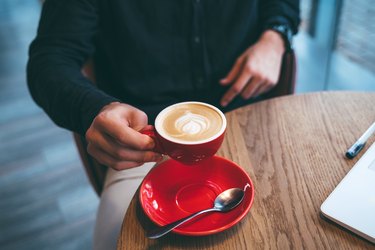
Medications like Ritalin and Concerta can help treat it attention-deficit/hyperactivity disorder (ADHD). But it's important to be aware of potential side effects and interactions so you can take it safely. Take coffee, for instance — is it OK to mix Concerta or Ritalin and caffeine?
Ritalin and Concerta are two brand names for the generic medicine methylphenidate, according to the Mayo Clinic. Methylphenidate is a drug that stimulates your central nervous system to treat conditions like ADHD and narcolepsy.
Video of the Day
Video of the Day
But when it comes to taking the medicine safely, is it OK to mix methylphenidate and caffeine? Below, learn about the connection between ADHD and caffeine, whether you can take Concerta with coffee and other side effects to keep in mind.
How Does Caffeine Affect People With ADHD?
Caffeine is a substance that stimulates your central nervous system to make you feel more alert, awake or focused, according to the U.S. National Library of Medicine (NLM).
It can be commercially manufactured and added to medicines, energy drinks and snacks, and also occurs naturally in plants like:
- Coffee beans
- Tea leaves
- Kola nuts
- Cacao pods
ADHD can cause difficulty concentrating, hyperactivity and impulsive behavior, according to the Mayo Clinic.
Caffeine, on the other hand, may counteract some of these symptoms. For instance, November 2020 research in the Journal of Clinical Medicine suggests that caffeine (from energy drinks, caffeine pills and other caffeinated drinks) can improve cognitive performance in adults with ADHD.
It may also help children with the condition: June 2019 research in Current Developments in Nutrition found that caffeine, L-theanine and a combination of the two all helped improve focus and cognitive performance in kids with ADHD.
Tip
Just because research shows caffeine can help ADHD doesn't mean you should self-medicate with the substance. While drinking coffee for ADHD may help ease certain symptoms for some, it shouldn't be used as a substitute for medical care or treatment.
Can You Mix Ritalin or Concerta and Caffeine?
Methylphenidate works similarly to caffeine in that it stimulates the central nervous system to help improve attention and decrease restlessness, according to the Mayo Clinic.
The Mayo Clinic does not cite any interactions between Ritalin and caffeine. And while having small amounts of caffeine likely won't cause harm, that doesn't mean you should always take Ritalin and coffee together.
That's because combining stimulants like Concerta and caffeine can have an additive effect, increasing your risk for side effects like high blood pressure or an irregular heartbeat, according to UC Davis. It may also intensify side effects like a racing heart, jitteriness or difficulty sleeping.
Talk to your doctor before combining the two to determine what amount of caffeine is safe for you, or whether it's best to skip it altogether.
What to Expect When Starting Ritalin
Ritalin's effects — positive and negative — can vary from person to person. Make sure you're taking your medication as prescribed to ensure it's as safe and effective for you as possible, per the Mayo Clinic.
Safety Considerations
Besides being careful about combining Ritalin and caffeine, there are some other precautions to keep in mind if you're prescribed this medicine. But what are the other side effects of Concerta?
According to the Mayo Clinic, a faster heart rate is the most common side effect of Concerta. Other possible effects may include:
- Chest pain
- Joint pain
- Fever
- Skin rash
It's also best to avoid this medicine if you're taking or have taken certain medications, including a type of antidepressant called MAO inhibitors, per the Mayo Clinic.
Tell your doctor about your medication history before starting Concerta so they can determine if it's safe or adjust your dose as needed (like opting for 36 milligrams of Concerta instead of a higher 72-milligram dose).
Tip
Ritalin does give you energy, which is why it's generally recommended not to take it later in the evening in order to prevent trouble sleeping, per the Mayo Clinic. Talk to your doctor about the best time to take your prescription.
- U.S. National Library of Medicine: "Caffeine"
- Mayo Clinic: "Adult attention-deficit/hyperactivity disorder (ADHD)"
- Mayo Clinic: "Methylphenidate (Oral Route)"
- Journal of Clinical Medicine: "Exploring the Role of Caffeine Use in Adult-ADHD Symptom Severity of US Army Soldiers"
- Current Developments in Nutrition: "L-theanine and Caffeine Improve Sustained Attention, Impulsivity and Cognition in Children with Attention Deficit Hyperactivity Disorders by Decreasing Mind Wandering (OR29-04-19)"
- UC Davis: "Stimulants"